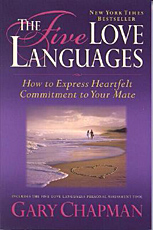Gary Chapman has been counseling married couples for more than 30 years, and his radio program airs on more than 100 stations. The Five Love Languages was a New York Times bestseller and has sold more than four million copies.
Here's a sobering statistic: 40 percent of first marriages end in divorce. Everyone talks about the importance and the energy of falling in love but few have the answers to keeping that original intimacy, passion, and togetherness alive. Chapman spells out what he calls "five ways that people speak and understand emotional love." The challenge in marriage is to speak your spouse's primary love language. The goal in this primary relationship is "not getting something you want but doing something for the well-being of the one you love."
The first love language is "words of affirmation." Verbal compliments, words of appreciation, constant encouragement: these are essential ingredients in a relationship that is based on mutual trust and gratitude. If your spouse's love language is words of affirmation, try to build him or her up as often and in as many ways as possible.
The second love language is "quality time." This means doing something together where you give your spouse your full attention. One way Chapman suggests doing this is to establish a daily sharing time in which each of you will talk about three things that happened during the day and how you feel about them.
A third love language is "receiving gifts." If your spouse loves surprises, honor this by giving gifts of money, possessions, or things you have created. Some spouses who speak this love language are most impressed with the gift of your physical presence.
The fourth love language is "acts of service." These expressions of love can range from doing little things around the house to taking responsibility for larger projects — tasks that require thought, planning, time, effort, and energy. Chapman suggests giving your spouse a love note accompanied by an act of service every three days for a month.
The fifth and final love language is "physical touch." Here kisses, hugs, and holding hands as well as sexual intercourse are important expressions of intimacy.
Chapman closes with various approaches to discovering your primary love language:
"1. What does your spouse do or fail to do that hurts you most deeply? The opposite of what hurts you most is probably your love language.
"2. What have you most often requested of your spouse? The thing you have most often requested is likely the thing that would make you feel most loved.
"3. In what way do you regularly express love to your spouse? Your method of expressing love may be an indication that that would also make you feel loved."
Love is a choice and love makes a difference, says Chapman. Try the tests on the last pages of this helpful work and you will gain a deeper knowledge of your probable love language.
